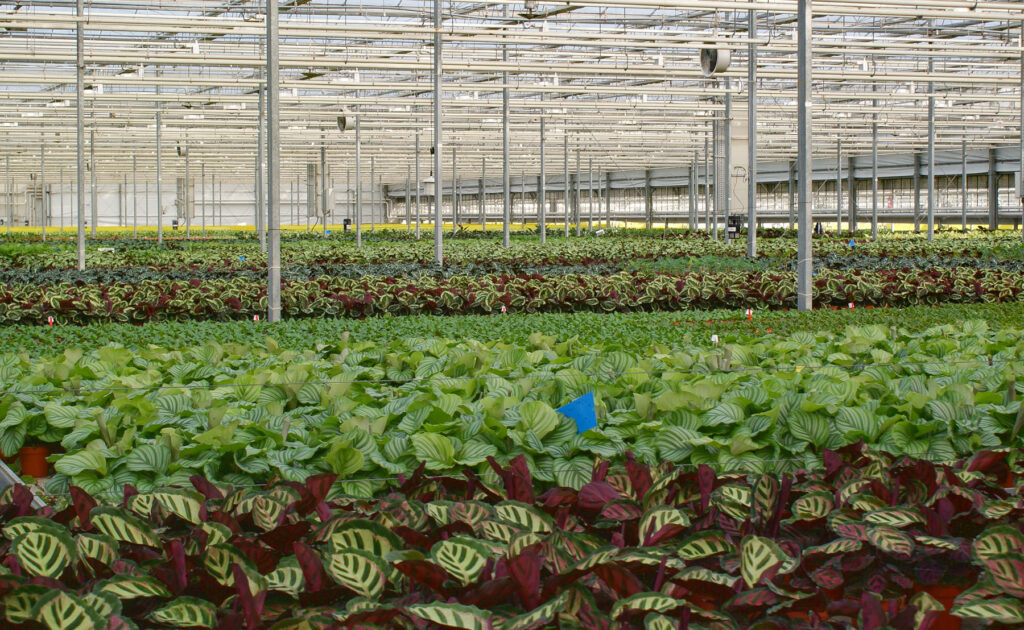You have slow food and slow coffee, and you also have growers who opt for a slow cultivation process. Horizon Plants is one of them. What do these slow trends have in common? Quality and craftsmanship, that’s what. The best genetic material as a start for extremely strong Kalanchoes and a wide range of houseplants.
Craftsmanship on the horizon
Quality doesn’t happen by itself. Tony Demuynck set up Horizon Plants in 1989. One hectare of Kalanchoes has since grown into 7 hectares of cultivation under glass and 4 hectares of outdoor cultivation. General manager Wouter Busschaert outlines a few pivotal moments. Wouter is no stranger to Floréac. He worked for them for no fewer than 18 years. “I occupied various different positions there. Just before moving to Horizon, I was Sales Manager for France. I also helped to develop this magazine and brought it to the attention of clients,” he says proudly. “Those were happy years at Floréac, but I wanted to be closer to the product. And my roots lie in agriculture. When I saw the opportunity to be at the helm of a growing nursery, I didn’t hesitate.”
Quality is in the genes
With Kalanchoes, the nursery had already been on a good track for years. Alongside the orchid, this is the best-selling flowering houseplant in Europe. How do you recognise a Kalanchoe from Horizon? “By the long flowering period and intensely coloured flowers. The result of super-strong Danish genetics. To this end, we work together with Danish breeder QUEEN, which is actually the largest in the world.”
Surfing on the success of green houseplants
About ten years ago, the Kalanchoe was joined by the Dipladenia. An originally southern flowering houseplant that Horizon grows and sells locally. This was the harbinger of the big switch that took place five years ago.
“Because we kept on growing and greenhouses were also added, we expanded our range to include green houseplants. Also because we noticed that they were gaining in popularity. Our flagship is the Calathea, a hit in plenty of living rooms. Of the thirty species that exist, we selected fifteen.”

Horizon didn’t pick these fifteen varieties at random. Quality and consumer satisfaction always take priority. If this requires a more intensive production process, Horizon will be happy to do it. This approach explains their strong position in the market. “Quality begins with the genetic starting material, which is why we only work with the best Belgian young plant breeders. We grow our Calatheas more slowly than Dutch growers, for example. However, this gives you a plant that is easier to maintain, lasts longer and distinguishes itself from others in terms of leaf colour. Precisely what today’s critical consumers are looking for.”
Green energy with cogeneration
These critical consumers also expect a product to be cultivated sustainably. So how is Horizon responding to this requirement? “For the heating and lighting of our greenhouses, we use a cogeneration system. We use the surplus energy that is released to supply families in the local area. We also have the most stringent MPS-GAP, GRASP and MPS-SQ certificates. We recycle our water. That’s the least we can do. But the bottom line is this: if you want to survive as a nursery, you must be innovative every day, have the courage to change and to switch.”
Floréac as a partner on the road
Following trends, meeting the needs of clients, switching creatively… Horizon Plants and Floréac have been on the same wavelength from day one. A collaboration that gives them both wings. “I know Floréac like the back of my hand, of course. It remains a loyal partner on the road. Even though I am now working on the product side. By the way, Tony, the founder of Horizon, also worked at Floréac in the distant past.
“I particularly appreciate the fact that Floréac never goes for quick wins but instead focuses on long-term cooperation.”
Wouter Busschaert
As partners, we know what we can expect from each other. I particularly appreciate the fact that Floréac never goes for quick wins but instead focuses on long-term cooperation. They think along with you, with the future in mind. Conversely, I also brought part of their vision to Horizon. We share the same values.”
What do consumers want?
Finally, we get to the trends. How does Wouter see the future? “There is still a lot of growth in the Kalanchoe as a garden plant. And green houseplants continue to do well in trendy interiors. Young consumers mainly look for plants that are less mainstream. To get closer to them, we recently launched a pop-up from which we sell directly to consumers. Ideal for putting out our feelers and finding out what they are looking for.”
